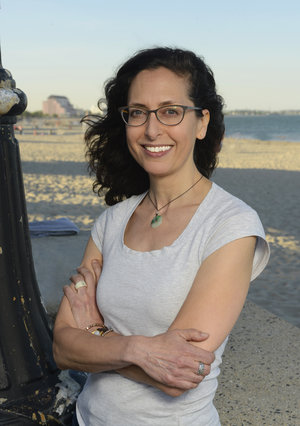From Our Authors | October 26, 2021

An Interview With Daphne Kalotay
In the interview that follows, Daphne Kalotay talks with TMR intern Angela Horina about her story “Heart Scalded” (TMR 44:2). Viv, the story’s protagonist, is a terminally ill cancer patient who attends a Halloween Party and endures a painful encounter with her ex. You can read the story here:
Angela Horina: Every time I read “Heart-Scalded,” I find another layer that I didn’t see before. You’ve managed to blend several themes into a traditional breakup story that touches on many topics: Viv is a terminally ill cancer patient, and she and Aziz broke up over moral divisions. How did you come to balance the different issues and themes in the story?
Daphne Kalotay: For me, the story is about understanding both that things come to an end—including our own lives—and that there are consequences to our actions, including grave ones for our planet and the people and plants and animals trying to survive on it. These themes were naturally entwined for me because the story was inspired by my dear friend, Judy, an environmentalist who was often morally enraged by a lot of what she saw around her (without being outwardly annoying about it) and who lived with terminal cancer for nine years. So the balance of topics occurred organically.
AH: Did you begin with the idea of a terminal illness story or the idea of a breakup story—or were the two intertwined from the start?
DK: They were intertwined from the start. During a summer toward the end of her illness, my friend attended a party (not a Halloween party, or a pig roast) where she knew her ex (the great love of her life) would be with his fiancée, whom she had never seen before. It struck me as incredibly brave. Then, before she died, she told me she hoped I’d write about her and her ex (with whom she was still close and who came to be by her side at the end). I still haven’t figured out how to write about that relationship, but the idea of the party where she faced meeting the fiancée stayed with me. Finally, last year, I was able to sit down and do something with it.
AH: “Heart-Scalded” is an incredibly visual story, and the setting itself acts as a kind of character (the references to color stand out). Why did you place so much emphasis on the visual?
DK: In part, I was simply imagining what the character would notice, since the story is a companion piece to a story I wrote a few years ago from Viv’s friend’s perspective, in which we learn a bit more about Viv’s paintings—so I knew that Viv, as an artist, would think visually and notice colors. And because the story is so internal, it reflects the way she experiences the world around her. As for that green color, green was Judy’s favorite color, and a couple of the walls in her apartment were painted a vivid green. She had many plants growing all around. So I’m not surprised that I seized on that color specifically.
AH: Viv’s vulnerability in the story is poignant: her dealing with shame of being “so Viv,” her facing her own mortality, and her seeing other people get stuck in their own decisions all force the reader to assess their own decisions. Was it part of your intention for the reader to experience Viv’s pain?
DK: As a writer, I want my writing to be true. I don’t mean that the story is a true story; I mean that whoever the character is, I’m being true to how that character would feel in the moment. And I think that when a writer does this, the reader is able to experience, to a certain degree, whatever the character experiences in a way that, as you point out, reverberates, so that we reassess our own experiences and decisions.
AH: There are pointedly political elements to this story. Would you consider, or have you ever considered, working on a political novel or series of stories?
DK: My first novel, Russian Winter, was about the lasting repercussions of totalitarianism, and my most recent novel, Blue Hours, is about white privilege and Western paternalism, with the second half of the book specifically about American intervention in Afghanistan. So it’s possible I’m unable to write a book that doesn’t in some way touch upon the political!
***
Daphne Kalotay’s books include the award-winning Sight Reading and Russian Winter, the fiction collection Calamity and Other Stories — shortlisted for the Story Prize — and the new novel Blue Hours, a 2020 Massachusetts Book Awards “Must Read.” Published in 20+ languages, her work has received fellowships from the Christopher Isherwood Foundation, MacDowell, Yaddo, and Bogliasco, among others, and her story “Relativity” was the 2017 One City One Story Boston pick. She teaches for Princeton University’s Program in Creative Writing but makes her home in Somerville, Massachusetts.
SEE THE ISSUE
SUGGESTED CONTENT

Featured Prose
Mar 15 2024
An Interview with Genevieve Abravanel
Recently, TMR intern Shayla Malone interviewed Genevieve Abravanel about “Wilderness Survival,” which tells the story of a recently widowed mom and her young daughter, who becomes an avid follower of a… read more

From Our Authors
Oct 06 2023
An Interview with Alexander Ramirez
Recently, TMR intern Michael Fegan interviewed Alexander Ramirez about his essay “On Defeat and Diego,” which was a runner-up for the 30th Annual Jeffrey E. Smith Editors’ Prize. Ramirez’s personal… read more

From Our Authors
Sep 22 2023
An Interview with Mona Susan Power
Recently, TMR interns Annalisa Geger and Kaitlyn Jensen interviewed Mona Susan Power about her story “Naming Ceremony,” which was a runner-up for the 2020 Jeffrey E. Smith Editors’ Prize. The… read more

